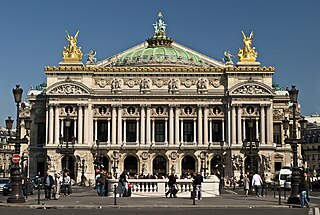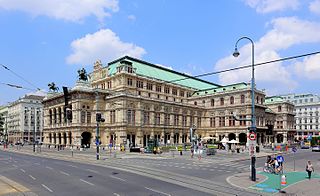Sources
- Holden, Amanda The Viking Opera Guide (Viking, 1993), page 371.
| This article about an Italian language opera is a stub. You can help Wikipedia by expanding it. |
La caduta de' giganti (The Fall of the Giants) is an opera by the composer Christoph Willibald Gluck. It takes the form of a dramma per musica in two acts. The Italian-language libretto is by Francesco Vanneschi. The opera premiered on 7 January 1746 at the King's Theatre, Haymarket in London.
| This article about an Italian language opera is a stub. You can help Wikipedia by expanding it. |

Opera is a form of theatre in which music has a leading role and the parts are taken by singers, but is distinct from musical theater. Such a "work" is typically a collaboration between a composer and a librettist and incorporates a number of the performing arts, such as acting, scenery, costume, and sometimes dance or ballet. The performance is typically given in an opera house, accompanied by an orchestra or smaller musical ensemble, which since the early 19th century has been led by a conductor.

Vikings were Scandinavians, who from the late 8th to late 11th centuries, raided and traded from their Northern European homelands across wide areas of Europe, and explored westwards to Iceland, Greenland, and Vinland. The term is also commonly extended in modern English and other vernaculars to include the inhabitants of Norse home communities during what has become known as the Viking Age, 798–1066 AD. This period of Nordic military, mercantile and demographic expansion constitutes an important element in the early medieval history of Scandinavia, Estonia, the British Isles, France, Kievan Rus' and Sicily.

Opera in German is that of the German-speaking countries, which include Germany, Austria, and the historic German states that pre-date those countries.
The Viking revival was a movement reflecting new interest in, and appreciation for Viking medieval history and culture. Interest was reawakened in the late 18th and 19th centuries, often with added heroic overtones typical of that Romantic era.

Celestyal Crystal, previously Louis Cristal, is a cruise ship operated by the Cyprus-based Celestyal Cruises and previously Louis Cruise Lines, both in the Louis Group. The ship was originally built as the cruiseferry MS Viking Saga in 1980 at Wärtsilä Perno Shipyard and Turku Shipyard, Turku, Finland for Rederi Ab Sally. In 1986 she was renamed MS Sally Albatross, and rebuilt into a cruise ship the following year. The ship was destroyed by a fire in 1990, and completely rebuilt at Finnyards, Rauma, Finland. She was re-delivered in 1992, still named Sally Albatross. After partially sinking 1994 she was rebuilt at Industrie Navali Meccaniche Affini, La Spezia, Italy, re-entering service as MS Leeward for Norwegian Cruise Line. Subsequently she sailed as MS SuperStar Taurus for Star Cruises, MS Silja Opera for Silja Line and spent a year laid up as MS Opera prior to entering service with her current owner in 2007.

French opera is one of Europe's most important operatic traditions, containing works by composers of the stature of Rameau, Berlioz, Gounod, Bizet, Massenet, Debussy, Ravel, Poulenc and Messiaen. Many foreign-born composers have played a part in the French tradition as well, including Lully, Gluck, Salieri, Cherubini, Spontini, Meyerbeer, Rossini, Donizetti, Verdi and Offenbach.

Antigona (Antigone) is an opera in three acts in Italian by the composer Tommaso Traetta. The libretto, by Marco Coltellini, is based on the tragedy Antigone by Sophocles. But there is also an opera Antigona by Josef Mysliveček.
Der Widerspänstigen Zähmung is a German-language comic opera in four acts by the German composer Hermann Goetz. It was written between 1868 and 1872 and first performed at the National Theatre Mannheim on 11 October 1874 under the conductor Ernst Frank. The libretto, by Joseph Victor Widmann and the composer, is based on Shakespeare's The Taming of the Shrew. The style of the opera shows Goetz turning away from the musical ideas of Richard Wagner towards the classicism of Mozart. Der Widerspänstigen Zähmung was a huge success, not only in Germany but in the United States and in Great Britain, where it received high praise from George Bernard Shaw.

Cendrillon (Cinderella) is a French opera in three acts by the Maltese-born composer Nicolas Isouard. It takes the form of an opéra comique with spoken dialogue between the musical numbers, although its authors designated it an opéra féerie. The libretto, by Charles Guillaume Etienne, is based on Charles Perrault's fairy tale Cinderella. The work was first performed by the Opéra-Comique at the Salle Feydeau in Paris on 22 February 1810. Cendrillon was a success throughout Europe until its popularity was eclipsed by that of Rossini's opera on the Cinderella theme, La Cenerentola (1817).
Mârouf, savetier du Caire is an opéra comique by the French composer Henri Rabaud. The libretto, by Lucien Nepoty, is based on a tale from the Arabian Nights. Mârouf was first performed at the Opéra-Comique, Paris, on 15 May 1914. The premiere was a great success and Mârouf became Rabaud's most popular opera. The score makes great use of oriental colour. The United States premiere of the opera was given at the Metropolitan Opera on December 19, 1917, with Giuseppe De Luca in the title role, Frances Alda as Princess Saamcheddine, and Pierre Monteux conducting. The opera was revived at the Opéra-Comique in 2013 in a production by Jérôme Deschamps, with Jean-Sébastien Bou in the title role, conducted by Alain Altinoglu.
Euridice is an opera in a prologue and one act by the Italian composer Giulio Caccini. The libretto, by Ottavio Rinuccini, had already been set by Caccini's rival Jacopo Peri in 1600. Caccini's version of Euridice was first performed at the Pitti Palace, Florence on 5 December 1602. Caccini hurriedly prepared the score for the press and published it six weeks before Peri's version appeared.
Pyramus and Thisbe is a "mock opera" by the German-born]composer John Frederick Lampe on the story of Pyramus and Thisbe. It was first performed at Covent Garden Theatre, London, on 25 January 1745. The anonymous libretto is based on Richard Leveridge's The Comickal Masque of Pyramus and Thisbe (1716), itself inspired by the "play within a play" in act 5 of William Shakespeare's A Midsummer Night's Dream.
The Lodger is an opera in two acts composed by Phyllis Tate. The libretto is by David Franklin, after the 1913 novel of the same name by Marie Adelaide Belloc Lowndes. The opera was commissioned by the Royal Academy of Music, with a grant from the William Manson Fund, and the premiere took place there on 16 July 1960.
La Semiramide riconosciuta is an opera by the composer Christoph Willibald Gluck. It takes the form of a dramma per musica in three acts. The Italian-language libretto is by Pietro Metastasio. The opera premiered on 14 May 1748 at the Burgtheater in Vienna.
Ipermestra (Hypermnestra) is an opera by the composer Christoph Willibald Gluck. It takes the form of an opera seria in three acts. The Italian-language libretto is by Pietro Metastasio. The opera premiered on 21 November 1744 at the Teatro San Giovanni Grisostomo in Venice. Ipermestra is the first of Gluck's operas to survive complete.
Tetide (Thetis) is an opera by the composer Christoph Willibald Gluck. It takes the form of a serenata in two parts. The Italian-language libretto is by Giovanni Ambrogio Migliavacca. The opera premiered on 10 October 1760 at the Hofburg Palace, Vienna.
L'ivrogne corrigé is an opera by the composer Christoph Willibald Gluck. It takes the form of an opéra comique in two acts. The French-language libretto is by Louis Anseaume and Lourdet de Sarterre. The opera premiered in April 1760 at the Burgtheater in Vienna.